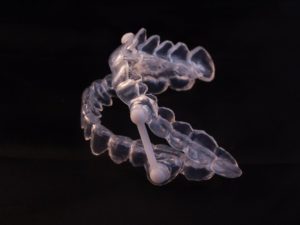
When you’re fitted with a new oral appliance to help you overcome sleep apnea in Columbus, it takes some time to feel comfortable with having the apparatus in your mouth. Thankfully, there are ways to make adjustments so you can have a more restful experience. As you continue reading, a local dentist provides details about what you can do to sleep peacefully.
The Common Problems with New Oral Appliances
Initially, having an oral appliance in your mouth will feel abnormal. As a result, your body will react in various ways as it attempts to accommodate the new addition. Here are some of the issues new patients often encounter:
- Discomfort and tightness – Because of its hard-plastic construction, the oral appliance may feel unnatural in your mouth. Many patients also experience a snug and restricting fit, which is actually necessary to ensure the appliance doesn’t fall out.
- Excessive saliva production and drooling – Early on, your mouth may respond to the oral appliance as if it’s food, producing more saliva. This can cause some drooling early on.
- Gagging – At first, patients with a stronger gag reflex may find it a little more difficult to insert the apparatus in their mouth.
- Nighttime removals – You may awaken to discover that your oral appliance is no longer in your mouth. That results from your body unconsciously removing it while you sleep.
How to Get Used to Your Oral Appliance
An integral component in adjusting to your oral appliance is time. By wearing the appliance every night, your brain and body can soon become more accommodating. This will help to calm the feelings of discomfort, regulate your saliva production and limit the instances of nighttime removals. On average, the adjustment period takes around 2 to 3 weeks.
What if the Problems Persist?
After 3 weeks have transpired, if you’re still having the same troubles, there could be an issue with the design of your oral appliance. Your dentist may be able to make some minor adjustments to improve the situation. In some cases, you’ll need a new appliance altogether.
While getting your brain and body on board with a new oral appliance may seem difficult at first, the long-term mental and physical health benefits of getting adequate sleep are well worth the additional effort!
About the Author
A graduate of The Ohio State University College of Dentistry, Dr. Eric Buck has a wealth of experience and a successful track record of helping patients enjoy the absolute best in dental health. An advocate of continued learning, he has completed several hours of postgraduate training throughout the years. Additionally, Dr. Buck maintains membership with the American Academy of Dental Sleep Medicine. He custom crafts oral appliances to treat sleep apnea at The Columbus Sleep Center, and he can be reached for more information or to schedule a visit through his website.
